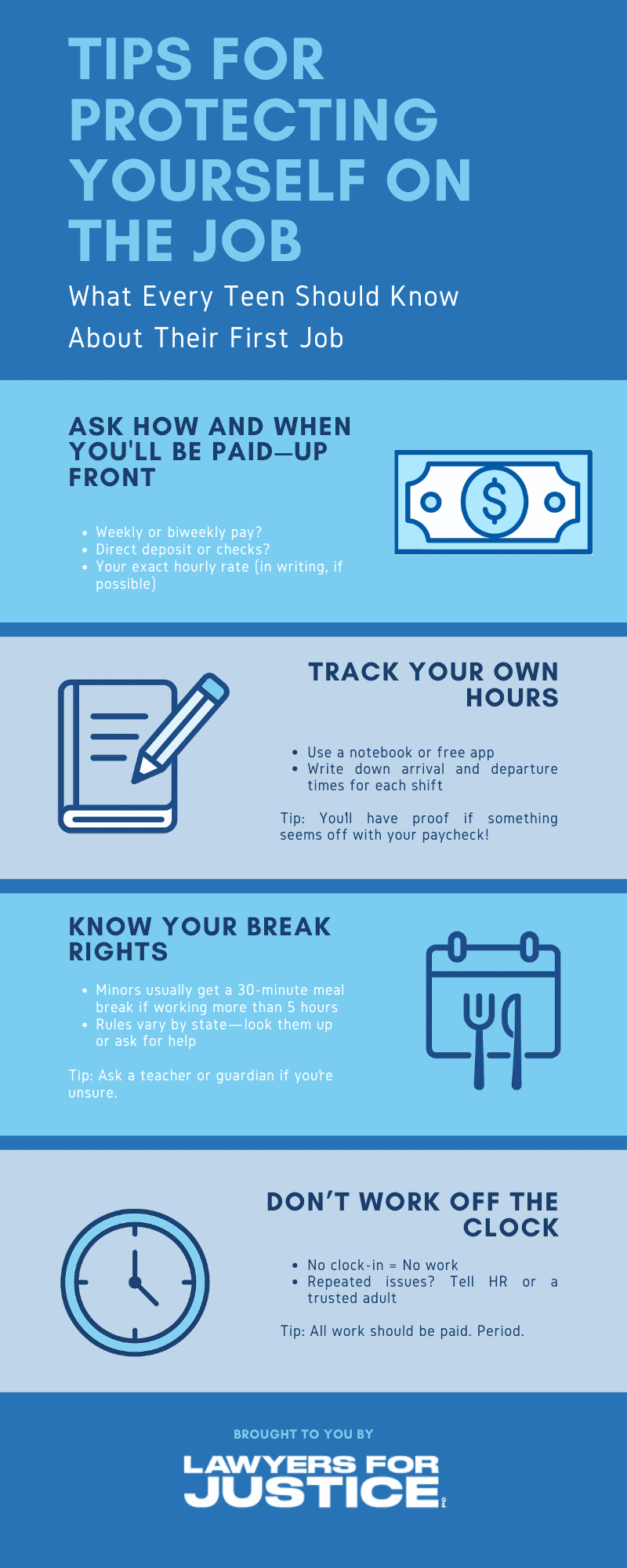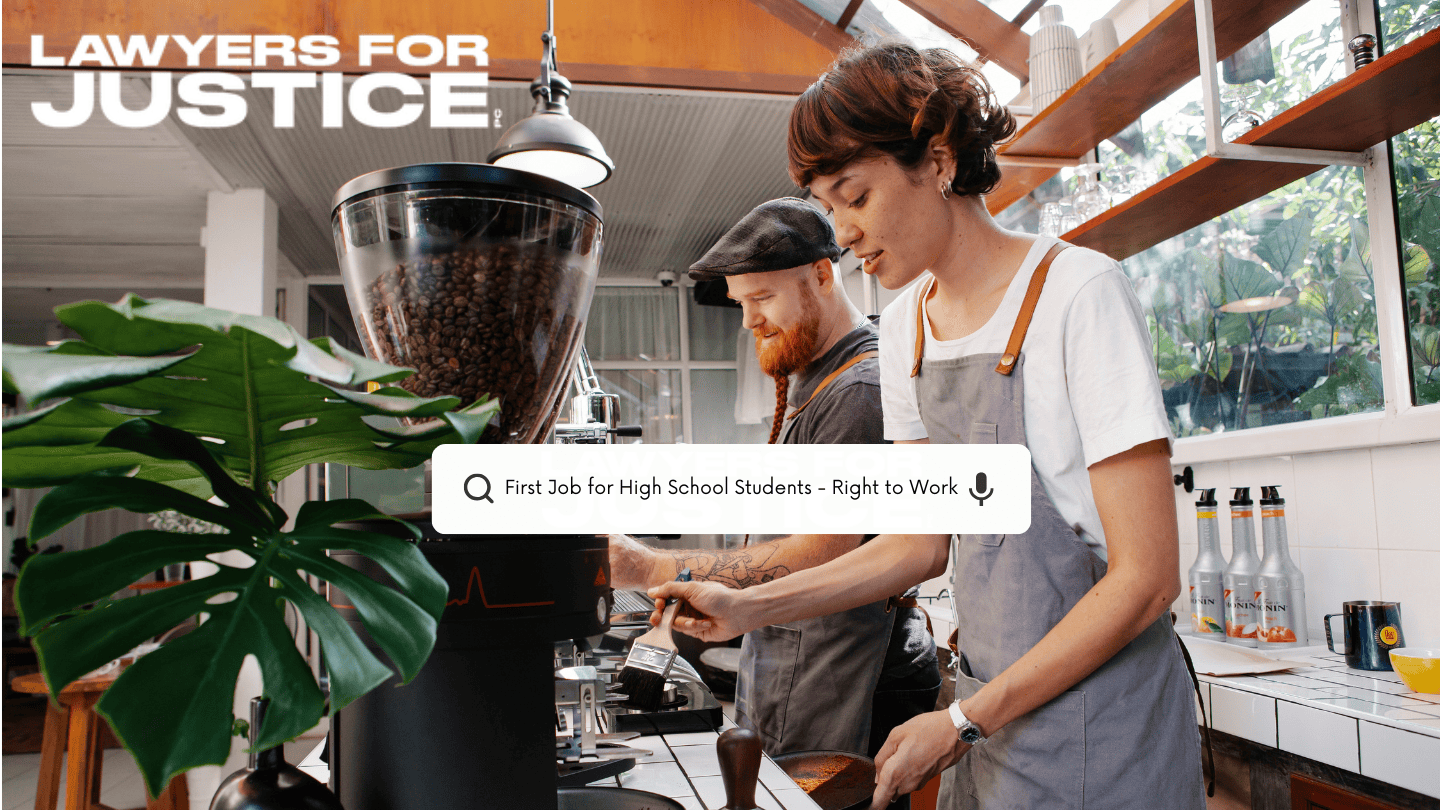Attorney advertisement by Edwin Aiwazian of Lawyers for Justice, P.C., headquartered at 450 N Brand Blvd, Glendale, CA 91203
Getting a first job is a huge milestone—but it’s also the first time many teens enter environments where labor laws actually apply to them. From fast food and retail to summer internships and after-school gigs, teens are often unaware of their rights—and that makes them more vulnerable to being taken advantage of.
High school students and their families should know about wages, breaks, safety, and red flags. Earning a paycheck shouldn’t mean giving up basic protections.
Teenage Workers Can Be Taken Advantage Of
Millions of teens enter the workforce every year, and many do so without understanding their rights as workers. Employers are often unaware—or worse, unbothered—by the rules. When labor violations happen, young workers are less likely to report them due to fear, inexperience, or simply not knowing something’s wrong.
By educating high schoolers and their parents about basic workplace rights, wage theft, unsafe conditions, and burnout can be prevented. At Lawyers for Justice, P.C., the powerful employment attorneys represent hundreds of clients in wage and hour cases and know how to help.
Common Problems Teen Workers Face:
- Being Paid Less Than Minimum Wage
Some employers assume they can pay teens less due to inexperience. Unless classified under a very specific “training wage,” workers are entitled to the standard minimum wage. - Unpaid Prep or Closing Work
Being asked to “come in early to set up” or “stay after to clean” without being clocked in is illegal—and incredibly common in food service and retail jobs. - No Breaks During Long Shifts
Working a 4–6 hour shift (or longer) often comes with the right to a break. Many teens aren’t aware of this, and some employers fail to enforce it. - Pressure to Work Off the Clock
Some managers ask teens to “volunteer” at events or “help out” on unpaid tasks. If it’s for the business, it must be paid, period. - Unsafe Work Environments
Teens are often given physically demanding or hazardous tasks without proper training or safety equipment. That’s not just unfair—it’s illegal in many cases.
Workplace Protections for Young Workers
- Ask How and When Payment Will Be Made, Up Front – Weekly? Biweekly? Direct deposit or paper checks? Ask the hourly rate and get it in writing.
- Keep a Personal Record of Hours Worked – Use a free app or notebook to record each shift worked, including arrival and departure times. This creates a reliable backup in case of underpayment.
- Understand Break Time Entitlements – In most states, workers under 18 are required to get a 30-minute meal break if they work more than 5 hours. Look up the state’s rules or ask a teacher or guardian to help.
- Don’t Work Off the Clock – If not clocked in, work should not be requested. If this occurs repeatedly, it should be reported to HR or a trusted adult.
- Say No to Unsafe Tasks – Being asked to operate dangerous machinery, climb ladders, or handle chemicals without proper training is a serious concern. Many jobs are legally restricted for minors and should not be assigned without meeting safety requirements.
- Talk to a Trusted Adult or Campus Counselor – If something seems wrong, it likely is. Teachers, counselors, or local worker rights centers can help address the situation safely.

When a First Job Crosses the Line
Speaking up at work—especially during a first job—can feel intimidating. A manager might skip required breaks, assign unsafe tasks, or pressure staff to work off the clock. It might not seem serious enough to report, but unfair treatment should never be ignored. Everyone has the right to a safe, legal workplace, and there are respectful ways to raise concerns. Support can come from a parent, school counselor, or campus legal aid service. No one should feel forced to accept unfair conditions just to stay employed.
These short phrases help set boundaries while showing professionalism, awareness, and respect.
- If asked to work before or after clocking in/out:
“I’m happy to help, but I need to make sure I’m clocked in first. I’ve been told it’s important to track all hours worked.” - If breaks aren’t being provided as required:
“I’ve worked over five hours today—am I supposed to be getting a break? Just want to make sure the rules are being followed.” - If assigned a task that feels unsafe or unfamiliar:
“I haven’t been trained on that yet—could someone show me how to do it safely before I try?” - If speaking directly to a manager feels uncomfortable:
Consider talking to a parent, trusted teacher, or school counselor. Try saying:
“I think something isn’t right at work, but I’m not sure how to handle it. Can I explain what’s been happening?”
What to Do If Workers’ Rights Are Violated
When workers’ rights are violated—especially due to inexperience or age—it’s important to remain calm and assess the situation carefully. The first step is to gather evidence that supports the claim. This may include photo or video documentation, pay stubs, legal documents, emails, detailed notes, or witness statements.
After collecting enough information, it’s wise to consult an attorney who specializes in employment law to better understand the legal options available. If the attorney determines there is a valid claim, they can assist with the next steps in the legal process. Many employment lawyers offer free consultations and work on a contingency-fee basis, meaning no payment is required unless the case is won.
Schedule a Free Consultation with Lawyers for Justice, P.C. Today
A first job should be a step forward—not a setback. Whether the work involves scooping ice cream, assisting in retail, or helping out at a summer camp, every worker deserves fair treatment and legal pay. At Lawyers for Justice, P.C., our attorneys support young workers with legal protection and the confidence to speak up.
Call 818-JUSTICE for a free case consultation or fill out the online contact form to get started.
Attorney advertisement by Edwin Aiwazian of Lawyers for Justice, P.C., headquartered at 450 N Brand Blvd, Glendale, CA 91203
Think you deserve justice?
-
Get a Free Case Evaluation
-
Retain Service with No Upfront Cost
-
Get the Justice You Deserve
-
No Win, No Pay









